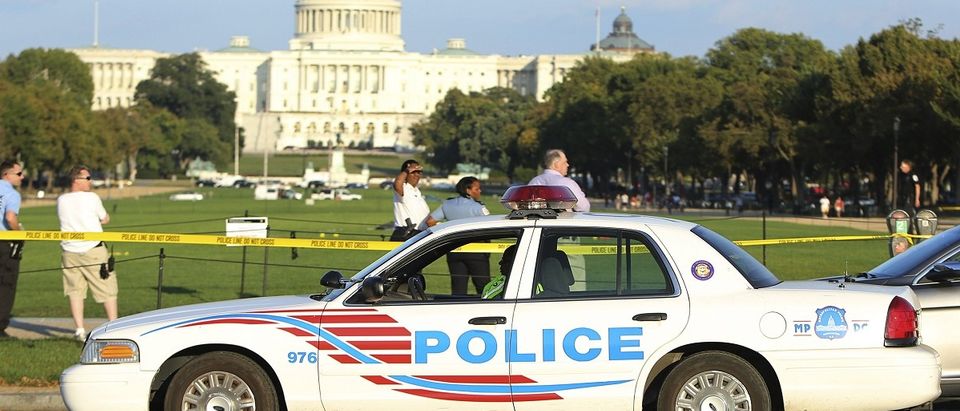Legislators in Washington, D.C., are pushing a criminal justice reform modeled after a California program that pays violent criminals a stipend not to commit crimes, and taxpayers are on the hook despite questionable oversight.
“I’m very skeptical of the concept,” Tim Lynch, director of the project on criminal justice at the Cato Institute told The Daily Caller News Foundation. “I think it’s frankly an awful idea and I think the policy makers have things backwards. If they have any money, I think it should be spent at the other end of the spectrum for people who are getting out of prison, and that is where the government tends to be very stingy.”
The proposal, spearheaded by Council member Kenyan McDuffie, pays up to 50 of Washington’s most violent criminals $1,000 a month to refrain from crime, particularly violent offenses like homicide. Criminals in the program will also submit to a mentorship and rehabilitation program in order to receive payment. (RELATED: Shocking Poll: American Generally Don’t Support Paying Criminals To Behave)
The controversial proposal is based on efforts in Richmond, California proponents claim is a success, however there is no direct measurement to track the success of the program. Additionally, the Richmond program relies on private funding, while the District’s proposal puts costs on the backs D.C. taxpayers to the tune of roughly $2 million over four years, reports The Washington Post.
“In D.C. this pay for peace proposal pays people for those minimum ideas, you know of living decent lives in society, like don’t harm other people, don’t steal their things,” Lynch told TheDCNF. “I think that concept is just very flawed. These are things people shouldn’t be paid to do.”
The Richmond program uses private funds to enroll individuals with violent records and histories of gang related conflict into a mentorship program which offers anywhere from $1 to $1,000 a month, dependent on the criminal’s level of active participation in the program.
To encourage participation, mentors are given a great deal of autonomy and are protected against divulging an individual’s criminal history, past or present. Critics say this independence from local police protected at least two participants that are still in the program, who were suspected of murdering fellow participants. In total, four of the participants enrolled since 2010 have died, reports The Washington Post.
With the success of the program based entirely on information from the mentors, it is unclear whether or not this program will have the intended effect in the District. Proponents point to the homicide rate in Richmond, which drastically decreased by 77 percent between 2007 and 2014, but there is no direct way to credit the stipend program with the drop in murders.
“There’s never been a real evaluation of the program,” D.C. Police Chief Cathy Lanier, who is also skeptical of the plan, told The Washington Post. “They didn’t design the program to allow it to be evaluated.”
D.C. Council members unanimously approved the pay for peace program in early March, largely in response to a 54 percent increase in the city’s homicide rate in 2015. McDuffie claims the proposal includes responsible oversight, however to protect participant identities, the public will not have access to records of the program’s success. McDuffie also inserted a provision exempting city data tracking the stipend plan from Freedom of Information Act Requests (FOIA). (RELATED: DC Council Approves Bill To Pay Criminals To Stop Committing Violent Crimes)
In Richmond, even the mentors admit they have no idea how the participants spend the stipend in most situations and bluntly accept it as a reality of the program.
“We don’t know where it goes, and I’m not sure we always would want to know where it goes,” Sam Vaughn, a senior mentor in Richmond told The Washington Post.
The pay for peace program promises to divide D.C. Democrats, lacking the key support of Mayor Muriel Bowser, who feels the District needs to focus resources on job training and stiffer penalties for crimes as a deterrent. The Council rejected criminal reform efforts from the mayor, including a bill which would have increased criminal sentences for crimes committed on city transit. Bowser did not set aside funds for the proposal in her 2017 budget outline, and without her support the plan may die before it ever gets going.
Experts say the city should be focusing it’s priorities on going after violent criminals instead of non-violent drug offenders, as well as helping convicts get back on their feet and participate in the local economy when they are released from prison.
“In my view the policymakers are just scrambling,” Lynch told TheDCNF. “They’re under pressure when the violent crime rate spikes. I think the main thing that needs to be done is to have the government put more of its focus and resources on identifying violent repeat offenders and getting them off the street.”
All content created by the Daily Caller News Foundation, an independent and nonpartisan newswire service, is available without charge to any legitimate news publisher that can provide a large audience. All republished articles must include our logo, our reporter’s byline and their DCNF affiliation. For any questions about our guidelines or partnering with us, please contact licensing@dailycallernewsfoundation.org.


